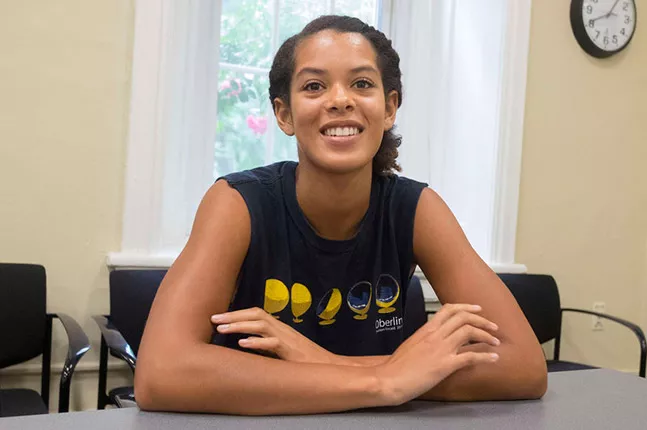Pass / Fail Policy Places Emphasis on Learning, Not Grades for First Years

Emma Morgan-Bennett '20, of New York, N.Y., found the credit/no-credit policy allowed for her to be a little more fearless in choosing her classes. Photo by Ed Hille for the Philadelphia Inquirer
Philadelphia Inquirer: It's learning, not grades that count for first-semester freshman at Swarthmore
Emma Morgan-Bennett isn't sure whether she wants a career in the humanities or the hard sciences, or a piece of both.
So the Swarthmore College freshman decided to use her first semester to explore. She'll take biology, introduction to education, and Spanish.
Oh, and costume design.
"Because, why not?" said Morgan-Bennett, 18, of New York City.
It's the kind of academic comfort and freedom that Swarthmore tries to encourage by having all first-semester freshmen take their classes pass/fail - or credit/no credit, as Swarthmore likes to call it.
Under the policy, professors share grades with students so they know how they did, but no A, B, C or D ever appears on an official transcript. They get credit or they don't.
The idea, college officials say, is to reduce the stress of that first semester for students who have spent their high school careers in highly competitive environments on "a bit of a hamster wheel," as one called it. Students are allowed to enjoy learning at a highly selective liberal arts college for the sake of nothing more than learning, said Diane Anderson, associate dean for academic affairs at Swarthmore [and associate professor of educational studies].
"They can do something that is serendipitous, that's outside of their comfort zone, and be more focused on the learning rather than grade achievement," Anderson said.
The 1,580-student college has had the somewhat unusual policy, also referred to as "shadow grading," since 1970, she said.
Many other selective colleges in the Philadelphia region do not have it. Not the University of Pennsylvania. Nor Haverford. Nor Villanova. Nor Bryn Mawr.
…
Anderson said some people outside Swarthmore also question the policy.
"One of the things they're afraid of is that students will slack off," she said. "Very few students here slack off."
Consider the quality of Swarthmore's current incoming class: Almost all of them were in the top 10 percent of their high school classes, with average reading and math SATs ranging from 1340 to 1530 out of 1600.
Freshmen pass 99 percent of the first-semester credit/no-credit classes, the college said.
...
Sedinam Worlanyo, 21, a senior from Ghana, said the first-semester policy helped her find her major. She came in thinking she wanted to study political science, but decided to try a computer science class.
"It ended up working out. I'm a CS major now," she said. "It allowed me to explore something that I otherwise would not have explored." [Listen to Worlanyo welcome the Class of 2020.]
…
Morgan-Bennett said the policy was one of the reasons she enrolled at Swarthmore. Her parents, both college professors, also liked it, she said.
"They were like, 'This is a really great opportunity to stretch your muscles before you decide where you want to focus in on,' " she said.
The policy, she said, also takes pressure off freshmen playing fall sports.
"It allowed us to be a little more fearless in choosing our classes," said Morgan-Bennett, a 6-foot middle blocker for the volleyball team.
Morgan-Bennett is contemplating a concentration of classes in the medical/anthropology area. She can see herself perhaps working in rural communities in Latin America with pregnant women.
But for now, she's enjoying that "really, really cool" costume design class.
Read the full article at the Philadelphia Inquirer.



